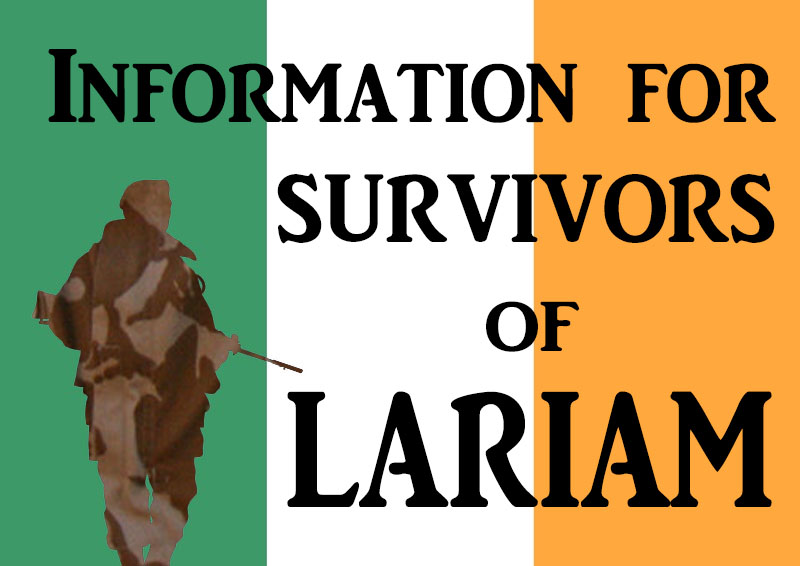
SURVIVORS’ STORIES – Personal Experiences Shared
To encourage people suffering from the effects of Lariam to open up about their experiences, and to empathise with others who are surviving Lariam use and its side effects, we invite anyone to share their stories and openly discuss their situations with other like minded members.
No names will be posted or have their identities revealed unless the individual wishes to be identified.
You can email us in confidence at info@laraiamsurvivorsinformation.com or via our Facebook Page, ![]()
Reading other Lariam Survivors’ experiences can resonate with those who suffer in silence, and see that they are not the only ones who feel the way they do. We encourage anyone who has experienced any adverse or serious side effects from Lariam use to reach out, seek help and talk to others who have suffered, and who understand.
– Norman Spicer, Tchad 2009
“I took Lariam on a trip to Tchad in 2009 and even before I left Ireland I was already having some side effects from the drug which I became aware of shortly after I began to take it. One morning I was driving into the barracks and I started to narrate my own journey into work, I did this for around 10 minutes before I realized I was talking to myself.
When I got to Chad I began to experience very vivid and violent nightmares on a regular basis and noticed that on certain days in the week I felt low or depressed. This cycle continued for the duration of the trip.
Since returning I have experienced dizzy spells while just getting off the sofa, these spells often result in me clinging on to something until it passes and I have also experienced anxiety that has made me nervous of heights and enclosed spaces which I never was before. I was a rock climbing/confidence training instructor in the army for a number of years and never had a fear of heights in my entire life or of spaces.
I still suffer from regular nightmares and the odd spell of anxiousness when in enclosed spaces or public transport. I also don’t like to be around larger groups of people any more and become irritable in these environments.”
– Norman Spicer, Tchad 2009
– Anon, Chad
“The following is my account of taking the prescription drug Lariam.
I have been in the Irish Defence Forces since I was 18. As I joined post 2004 I was required to fulfil certain terms to satisfy the terms of my contract and ensure I could extend beyond the initial five year period. One of the terms of this contract was that I travelled overseas with the Defence Forces. The opportunity I had to go overseas was on a mission to Africa, specifically Chad.
During our pre-deployment training we first became aware of the drug Lariam, which we would be required to take in order to protect against malaria. We were made aware of the side effects of this drug by the senior staff who joked and spoke casually of ‘Lariam nightmares’ and short term memory deterioration. As this topic was approached casually we didn’t take the rumoured side-effects seriously. We were made aware that if we refused to take this drug we would not be permitted to travel overseas and that if we went to a doctor with any of the reported side effects that we would jeopardize our chances of travelling overseas again, which in turn would seriously affect our future careers. It was made clear to us by the doctor that performed our overseas medicals that if we didn’t take the drug throughout the duration of the trip we would not be able to travel. I was made conscious, following the trip, that a number of personnel had approached their own civilian doctors before travelling to get the safer alternative drug known colloquially as ‘Doxys’. These personnel still collected their prescriptions of Lariam from the army medical personnel to give the impression they were taking it so as to not jeopardise their chances of travelling.
During the duration of the mission I witnessed firsthand the side effects from this drug. On two occasions I woke up shouting and fell out of my bed space until I was awoken by those who shared the living accommodation. There were noticeable lapses in my memory which included walking to a section of the camp we occupied and having difficulty remembering why I had walked there. Throughout the whole trip these side effects were discussed in a humorous fashion. I noticed changes in my own behaviour and changes in my colleagues who I was in close proximity with, the most noticeable of which was vivid nightmares and the deterioration in short term memory. At all times the short term side effects were treated as a humorous topic and no serious discussion about the side effects was raised. Any of my colleagues were afraid to approach the doctor as we were acutely aware we would not get overseas again if we raised serious concerns about the effects of the drug.
Upon our return from the overseas environment we were instructed to continue taking Lariam for a number of weeks. During this time my family commented that I was displaying uncharacteristic behaviour which included short lapses of anger, forgetfulness and emotional behaviour such as breaking down in tears and becoming distant with close relatives and friends. In time I felt that I did come back from the severe side effects and have been able to continue operating in a more ‘normal’ manner. I do firmly believe that my short term memory has been permanently impaired by the use of this drug. I also firmly believe that I will be more likely to suffer from brain related disease as I age due to the use of this drug which had a noticeable effect on my behaviour.
I was also deeply troubled to hear rumours that the officer ranks were given the choice between the Lariam drug or the safer alternative known as Doxy. This made me feel like the welfare of the enlisted men was considered inferior to those of the officer ranks. I was even more troubled to learn that there already existed medical publications that clearly outlined the negative effects of the drug which would have been easily available to medical staff within the Defence Forces which was clearly not considered which pointed to even more severe side effects such as depression and in some cases suicide.
Even in the army today there is a fear within the ranks that any action taken against the army would result in jeopardising your future chances of going overseas and would negatively effect the persons chances of promotion. There is also the fear that the person who made complaints being subjected to the kind of indirect bullying that occurs where there are steps taken at the higher levels to damage someone’s career or reputation such as not recommending personnel for courses, marking them harshly during promotion interviews or scrutinising their actions more deeply than their peers. There is also the fear that speaking about these effects will cause the person to be medically downgraded resulting in their career being halted.
I firmly believe that this drug has affected my brain and the noticeable damage now is my short term memory being severely impaired. These are colloquially termed ‘Lariam Moments’ in the Defence Forces and occur when a person repeats the same information to another, such as giving another the same instructions more than once or repeating stories without remembering that you had told someone earlier. As this damage is noticeable now I am concerned that this may affect me as I age, which concerns me when I anticipate my future family life and prospects.“
– Anon, Chad


